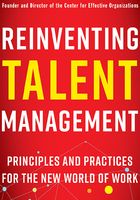
TALENT MANAGEMENT SHOULD BE PERFORMANCE FOCUSED
The talent management systems in an organization need to be focused on the type of performance it requires from its talent to be strategically successful. The types of performance needed may vary from individual excellence to outstanding levels of group, unit, or organizational performance. Most bureaucratic talent management systems fail to take into account the complexity and importance of different types of organizational performance. They usually promise promotion and meritbased salary increases to the “best performers” and on the basis of seniority. This often is not the right approach, particularly with respect to promotions and to creating talent management systems that support organizational effectiveness. It ignores or fails to focus on the critical performance behaviors and talent development motivators that are needed to make the organization effective and that therefore should be the focus of talent management systems.
What is needed to develop talent management systems that are correctly performance and development focused is a strategic analysis of the type of performance an organization needs from individuals, groups, and the total organization to implement its strategy. This needs to be followed by a process that uses the results of such an analysis to motivate and develop the kinds of behaviors the organization needs at all levels and in all segments to be effective. These behaviors then need to become the key to what is rewarded, how talent is recruited, and how it is developed.
We can take as an example an organization in which cooperative and team behavior is very important. The right approach to rewards may be a group-or organization-wide incentive plan (e.g., a profit-or stockoption plan) rather than a traditional merit salary increase plan. It may also include training and development that focuses on cooperative team behavior. Finally, it might include a recruiting and selection system that is targeted at hiring talent that performs well in team-based organizations.
An important feature of every organization should be the attraction and retention of high-performing individuals with key skills. This ties directly to the reality that in today’s work world the individual performance of key contributors plays an increasingly important role in the overall performance of many organizations. Because of the growing complexity of work and organizations, individuals can increasingly be the difference between an organization that is successful and one that just survives or, for that matter, fails. The reality is that more and more people are in critical positions in organizations because their individual performance has a major impact on the overall performance of their organization.
Increasingly, it is not enough to have someone who just gets the job done. For many types of work, organizations need people who get work done at higher levels than that being done by their competitors. This can only be accomplished by having talent management systems that focus selectively and strategically on the performance of individuals, teams, and the organization as a whole. Particular attention needs to be focused on work that is done at very different levels of effectiveness and has a key impact on organizational performance. Strategically important work that is performed at very different levels of effectiveness by individuals and groups is where the right talent management systems can have the largest positive impact on organizational performance.
Overall, talent management practices need to be aligned with each other and the organization’s strategy and structure to create the mix of individuals and work units that can perform at a level that makes a difference. This can only be done if they focus on competencies, their impact on performance, and competitive advantage rather than on issues of fairness, seniority, and hierarchy.